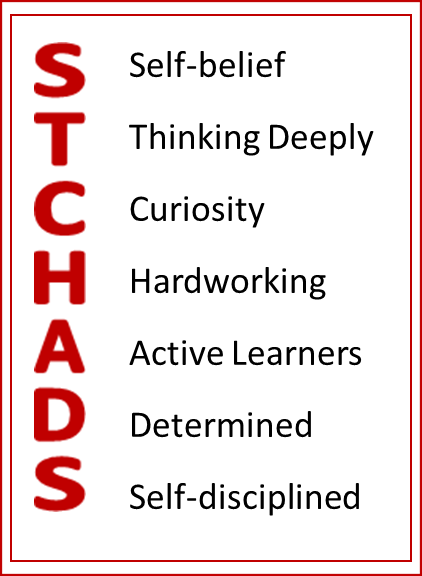Curriculum Overview
Our school mottos is: Grow in Love, Live in Peace
Our Core Learning Principles underpin the intent, implementation and impact of the St Chad’s curriculum. They are at the very core of our 'why' and define us as a school; we strive to create a supportive and friendly environment where each child has the opportunity to develop the highest possible standards of achievement, fulfilling their spiritual, academic, moral and physical potential in an environment of tolerance of individual differences where Gospel Values permeate daily life, and we strive to use our skills and talents for the good of all.
We use our school’s core learning principles of

to personify the kinds of people that St Chad’s develops.
Our curriculum is thematic, with a Humanities (History/Geography) or Science driver, within which key vocabulary, knowledge and skills are organised. Carefully chosen high-quality texts are used within English lessons, connected to the topic. The cross-curricular nature of our curriculum facilitates a rapidly changing context (increasing amounts of children who are bilingual and multilingual, reflecting a 21st century London) in making relevant links across curriculum subjects so that learning is meaningful, connected, purposeful and organised. These cross-curricular links are not contrived, but include relevant progressive learning objectives from the national curriculum to develop pupils as readers, writers, artists, geographers, historians, scientists, linguists, technologists, mathematicians, musicians, global citizens, philosophers and sportspeople. The language used within our curriculum mapping and delivery reflects this ambition for our pupils.
We regularly evaluate our curriculum against a rapidly changing context and pupil achievement, and will on occasion teach discrete knowledge and skills to address an identified need, e.g. grammar. We have mapped out grammar teaching for every year group across the school, considering who our pupils are (multilingual), to equip them with what they need to access and show understanding across the curriculum.
Considering our awareness of cognitive load theory, we use 'knowledge organisers' for our humanities and science driven topics. Having key knowledge and vocabulary in one place supports pupils' learning across the topic and alleviates the immediate burden of having to remember a large quantity of information (potentially overloading working memory and preventing knowledge from going into long-term memory).
Previous years' knowledge organisers are available to the subsequent teachers, who use these to refer back to prior learning with pupils, and ensure that new learning builds on what has come before - particularly making use of previously learnt disciplinary knowledge. This helps make sequencing more explicit to our pupils, and facilitates retrieval of prior learning, supporting it in becoming firmly lodged within long-term memory.
Sticky Knowledge
Sticky Knowledge is effectively knowledge that will stay with us forever. In other words, an alteration has happened to our long-term memory. Sticky Knowledge can be divided into two main parts: interesting facts that will remain with us forever and knowledge that individuals need to learn as part of the National Curriculum. Through our curriculum we have identified the knowledge that we want to stick, so that further knowledge can be linked or hung onto it. We use flashbacks, which consist of 4 questions from: – last lesson, last week, last term and last year, to help the children retain key knowledge. Each class displays the Sticky Knowledge and the children build up a record of them in their books.
Enrichment Experiences
We have carefully mapped enrichment experiences that complement each topic and provide meaningful context to learning, ultimately enhancing pupil understanding. These experiences are also key to our pupils' personal development, supporting them to develop in many diverse aspects of life and allowing them equal opportunity to experience people and places that they may not have access to otherwise; building cultural capital.
Our school’s core learning principles are encompassed throughout these chosen experiences, helping our pupils to develop key life skills such as confidence and resilience, as well as those skills that we too often take for granted - how to use transport systems, how to interact with others and how to conduct themselves in public. All of these skills are crucial components in preparing our pupils to become successful, active citizens in their adult lives.
Year group teachers organise trips relevant to the curriculum with the aim of all classes going on 1 trip per term.
Examples of some of our previous trips are:
Reception: Dulwich Picture Gallery, Godstone Farm
Y1: Hever Castle, Hampton Court Palace
Y2: The Wetlands Centre, Wisley - RHS Gardens
Y3: The Ragged School, Dulwich Gallery, Beckenham Place Park
Y4: Horniman Museum, Morden Hall Park
Y5: The British Museum, Whitgift School, National Observatory, Science Museum, Parliament
Y6: The Maritime Museum, The Globe Theatre, Fryland Woods
Year 6 Residential Trip: Every year the school organises a residential trip for the Year 6 pupils. This trip takes place at a PGL centre in Hinehead. The Residential Trip provides the children with a chance to bond with their fellow classmates and teachers outside the school setting and encourages them to develop confidence, independence and maturity before they transition on to Secondary School.
Visitors & WORKSHOPS
We arrange a number of visitors throughout the year to talk to our pupils. Some examples of the visitors that we welcome to the school are:
- NSPCC
- Authors – Scholastic and Waterstones
- Theatre groups linked to Humanities focus
- British Legion
- Emergency services
- Dog Trust
- TFL for transition
- Metropolitan Police
- London Fire Brigade
Examples of workshops provided by external companies:
- STEM Workshop – Building Bridges
- Florence Nightingale Workshop
- Romans Workshop
- Stone Age Workshop
- Life Space
- Great Fire of London Workshop
- Anti-gang workshops
- Carbon Monoxide workshop
